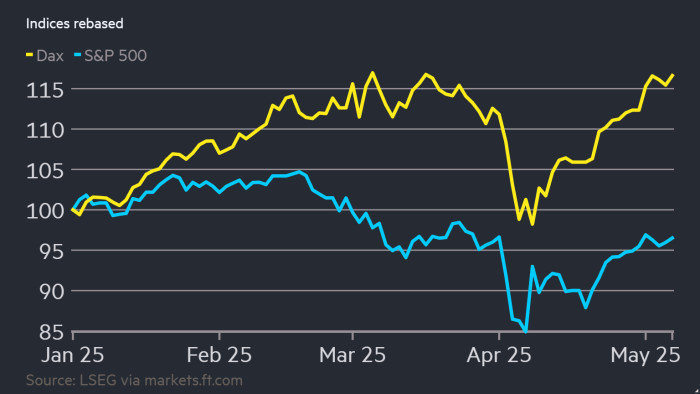Unlock the Editor’s Digest for free
Roula Khalaf, Editor of the FT, selects her favourite stories in this weekly newsletter.
Germany’s Dax index climbed to a record high on Friday, becoming the first major European benchmark to recoup the losses sparked by Donald Trump’s tariff threats, as investor optimism over US trade deals boosted global markets.
The Dax was 0.5 per cent higher in afternoon trading, after Thursday’s announcement of a US-UK trade deal was followed by a call between the US president and Germany’s new chancellor, Friedrich Merz, in which they agreed on the need to resolve trade disputes quickly.
Merz, who warned after his election victory that Europe needed to “achieve independence” from the US, also struck a conciliatory tone with Trump, saying Washington remained an “indispensable friend and partner”. Both leaders had agreed to meet in the near future, the German government said.
Officials from the US and China are also scheduled to meet this weekend for talks over the trade war. Treasury secretary Scott Bessent and trade representative Jamieson Greer will represent the US, while China’s delegation will be led by vice-president premier He Lifeng.
US stock futures weakened on Friday after Trump wrote on his Truth Social network that an 80 per cent tariff on China “seems right”, signalling a potentially smaller reduction in the punitive levies than investors had anticipated.
Futures tracking the S&P 500 dipped after Trump’s post before regaining some ground to trade 0.2 per cent higher.
The Dax’s return to all-time highs also reflects the wave of enthusiasm for German stocks sparked earlier this year by Merz’s plans to increase borrowing and inject hundreds of billions of euros into the country’s military and infrastructure.
Emmanuel Cau, head of European equity strategy at Barclays, said the trade news had given a broad boost to stock markets.
But he added: “There is an extra degree of excitement in Germany as part of this revival narrative and the arrival of the new government. There’s more and more interest in Germany.”
German bonds, which have rallied in recent weeks while investors were seeking havens from market turmoil, gave up some of those gains as riskier assets outperformed.
The yield on 10-year German government bonds increased 0.04 percentage points on Friday morning, rising to 2.56 per cent. Bond yields move inversely to prices.
European stocks have outshone their Wall Street peers this year because of optimism over defence spending combined with growing fears over the impact of Trump’s trade war on the US economy.
The Dax is up nearly 18 per cent this year. Defence stocks have performed strongly following the spending commitments, with Rheinmetall up more than 170 per cent.
The German stock market has also benefited from a strong performance from European banks. Deutsche Bank shares have risen 43 per cent this year.
While US stocks have also recovered their losses since Trump’s “liberation day” tariff announcements in early April, the S&P 500 benchmark remains well below its February all-time high and is down nearly 4 per cent so far in 2025.
Europe’s outperformance of Wall Street this year has partially narrowed a large valuation gap between US and European equities that had widened in recent years due to a relentless rally in US tech stocks.
“Peak trade fear is behind us,” said Laura Cooper, global investment strategist at Nuveen. But she added that “bouts of choppy price action” should be expected as the disruption from tariffs washes through the global trading system.
But asset managers have also urged caution, given Trump’s strong rhetoric on tariffs and broader concerns about US policymaking.
“For now, this [rally] is holding,” said Kevin Thozet, a member of Carmignac’s investment committee. “But it is not evident that it will continue this way for a very long time. Peak Trumpism may be behind us but uncertainty is still there.”


